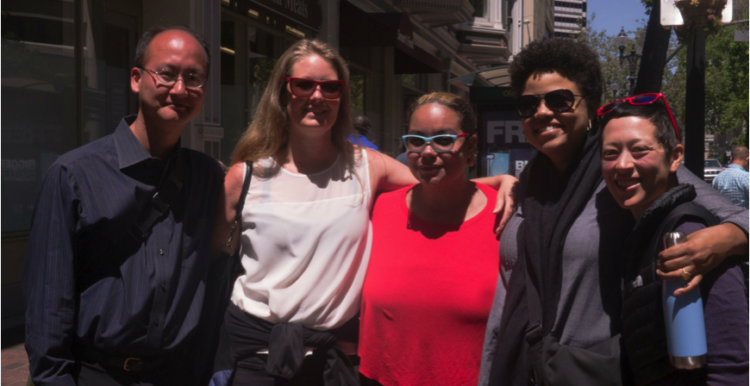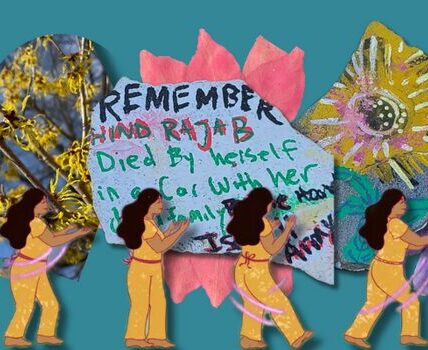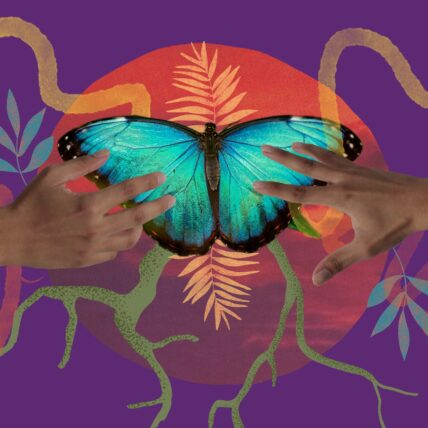Only those who attempt the absurd will achieve the impossible.
M. C. Escher
Engage, Experiment, Emerge (E3) is a learning project initiated by MAG. We call it a Creating Conditions Lab because its aim is to support and grow conditions that enable social justice actors (including MAG, our clients and partners) to create transformative progressive change. We, along with the other participants, started E3 to strengthen our capacity to experiment collaboratively — a necessary capacity for the change we seek.
Who and Why We Are
We are a small and mighty group of people who have been supporting collaborative efforts toward justice specifically with an experimentation stance for the last few years. We, and the networks with whom we work, are people experimenting our way forward – testing ideas for progressive social change with a long-term systemic frame and intention. Together E3 participants are suppporting over a dozen movement networks that are bringing together over a hundred organizations working toward a world in which resources and power are generated and shared in ways that enable everyone the opportunity to realize their potential and live life fully.
More specifically, we are Elissa Perry and Mark Leach (not pictured) of MAG, Jodie Tonita of Social Transformation Project, adrienne maree brown of Emergent Strategy Ideation Institute and generative somatics, and Eugene Eric Kim of Faster Than 20.
We are who we are, simply because we started where there was already relationship and trust which supports iterating quickly, transparently, and vulnerably as we make mistakes and fail – a lot!
We know in our bones that we won’t get to where we want to get without connection and a practice of experimenting collaboratively. While we have known for a long time the importance of collaboration and connection of learning, we were often working separately and where we were working collaboratively, we lacked accountability around our experimenting together and were working in a way that undervalued regular, intentional practice in our collaboration.
To learn from and about each other’s work, some of us were participating in intentional learning with others while others of us relied on periodic one-on-one coffee dates once or twice a year or on the random meet up at a conference. “We can and must do better,” we thought.
E3 was born as an experiment to build and model a discipline around naming what we think success / failure is, holding ourselves accountable to that, and practicing – putting more rigor into our shared learning and experimenting, and our efforts to support progressive social change.
We are documenting our process and learning as we go with the aim of sharing all of it so that other experimenters and potential experimenters toward progressive social change might come together with or without any of us to learn collaboratively and continuously improve our practice of supporting progressive change. We asked Alison Lin to create the container and help facilitate our process of experimentation.
What Do We Mean by Experimentation?
Experimentation is a central practice for groups trying to collaborate more effectively, especially those that are trying to tackle complex problems. In particular, experimentation is a powerful way for a group to learn and improve collectively and quickly.
Alison Lin & Eugene Eric Kim
Experimentation is a learning process. By experimentation we mean — posing a question or hypothesis, designing an action to test the hypothesis, identifying success metrics, reflecting on the learning, and iterating to a follow on question/hypothesis – all in rapid feedback loops that are fast enough to keep momentum and slow enough that the elements of the experiment have the integrity to actually answer the question.
Our experimentation also includes intentional reflection together on our experiments to deepen the learning, understand the implications of it, and figure out ways to act on it (or not) by engaging each others perspectives and experiences. In this process of collective meaning making we’ve realized that the conversation is the tool. We have seen and believe that experimentation will continuously lead to meaningful learning whether the experiment is successful or not. The positive outcome of every experiment is learning that gets us closer to the end result we seek of working better together toward our common justice goals.
Sometimes that learning looks like failure. Sometimes is look like success. At all times, the keys are: a clear question with success metrics, time to reflect on learning and being really intentional about pace (balancing spaciousness and momentum) and iteration (building on the learning to the next hypothesis and experiment to get to the big question).
We are learning our way forward. It is hard. It is fun. And it is not a choice. It is an imperative for justice.
What Does This Look Like? Some Sample Experiments
In just 5 short months we managed 15 experiments – both individual and joint experiments.
One experiment was on how and where we collected updates and communications about our experiments. We tried instagram and google folders and facebook and email and after one round of iterations and a collective instagram experiment failure, adrienne moved us to cell.y as one of our experiments. Jodie and Elissa reflect on the value of cell.y in this video!
Integrating multiple ways of knowing into our experimentation was important to us. One of the things that turned out to be a key engagement factor for us was that we committed to embracing multiple forms and dimensions of sharing and documenting our work. Some of our documentation and sharing of learning took the form of poetry, photography, doodles, biomimicry, movement, video.
Thus, another experiment came in the form of poetry. Elissa conducted an experiment where she attempted to document the emotional landscape of being in an experimentation process and stance by writing poetry about it. Her hypothesis was that if we had a deeper understanding of this aspect of doing social justice work that often doesn’t get considered or discussed it might have implications for how we think about, do, and hold the work going forward. This experiment turned out to be a success.
Sample Poetry (Structure for Complexity: An Experiment)
1
Where to jump in to this vast cycle circle. It’s beginning and end elude me. If they exist at all.
In any moment things can appear as fractals. Some are. And some have pattern in retrospect. In the love view, where all time exists at once, long arcs of generations, of species, of existence and not, extend in all directions and inside each of us all at once.
And wee radical shifts. Departures and arrivals. Passings and landings. Transplanting, hybridizing miracles of unexpected grandeur and massive rupture – cleaving and heaving, tears and birth and joy.
Knowing this. Holding this. Murky in our synapses, perhaps clear in our hearts. Let us begin here. With a window.
2
Then sucked back in – chest first, hips pressed long. Head, hands and feet to come later. The arch in my back seeking the arc/k of justice its curved and expansive hull, I pass through the glassless frame. Heart still clear.
Snatched back and affixed to the now by the blood of boys – all my relations – spilled in the streets thick with grit of…
Roped in by the girls – all my relations – being pushed out of school and possibility and pulled into cages of…
…Iron and mindsets.
Dragged from slumber. From universal wondering and wandering. From the insufficient plodding through predetermined plans. By all the deer – all my relations – run down the Monday after daylight savings.
They don’t know their nights of freedom have been cut short by an unnecessary habit of saving time. Hoarding.
Drawn by the realization that the redwoods have a cough and they might not make it this time.
…Iron and mindsets.
We begin.
What We Learned From the Poetry Experiment
Creating poetry supported the opening of a space to more naturally and organically capture the emotions of the social justice work. Space for the emotional end of the work, as well as space for art and other ways of knowing to be integrated into our experiments, strengthens our capacity to do the work.
“It was a big aha moment to see the value of capturing the emotional tenor of the work more or less as it was happening. This work is hard. It’s easy to say that and to repeat it, but the periodic poems capture it so much more effectively. “
“I think, as a consultant, I’ve always attempted to integrate this [honoring the emotional piece] into my work with clients, primarily by assuming that part of my work would be to play a coaching role…. And, I think I’ve made a big shift, but, I can do an even better job.”
“Giving folks an outlet to express their struggles, then using that to help monitor the rhythms of the group would be super valuable, and it would help guide building in structures to support people through this.”
So What: Reflections on Learning So Far
Having pushed ourselves to experiment collaboratively across organizational and project boundaries, there are several things we will do differently moving forward.
Timing
We will paymore attention to the timing of experiments. Pushing rapid iterations with just enough spaciousness for creativity and grappling with what’s hard.
Framing
The rigor and clarity of the questions guiding the experiments are important. We have a tendency is to ask questions that are doable, with less risk of failure. These are not necessarily the most fruitful learning questions. In order to really make progress, we have to ask bigger, harder questions.
Trust & Risk
Initial experiments may not be risky, but may be the way in needed to get to the bigger risks. We can start with closer in iterations with less risk with the intention of going riskier/deeper in future iterations.
Test the easy assumptions first. If they hold true, then you can keep going. If not, then you may have avoided a longer, bigger, more drawn out thing that would have cost more in time and resources and not led to anything.
Accountability & Testing Smartly
This process is both about a learning practice and rigor around experimenting, risk-taking, success, and failure. What was really different: having concrete learning questions, with hypotheses, and indicators up-front for our collaborative experiments. Just having a space to be reflective is one level/kind of learning practice that is important.
However, having the rigor of accountability, and measurement, and time boundaries…is really different! Without the rigor we are never wrong because we are always learning. And this can exacerbate the power dynamics in groups because the person/people with the most power make the decisions about what comes next. Experimentation calls us to be truly accountable to the data and to be consciously intentional about when we are not going to be accountable to the data. Even when we don’t agree, we can at least get clear about what the question is and what we think will happen from the get go and then we can try it!
What’s Next
After 5 months we got together for our “final” meaning-making meeting during which we all enthusiastically agreed that we are just getting started and want to continue.
So far we have identified some next sets of experiments in the following areas among others:
- A public facing interface making our learning, process, and progress more accessible outside of our small group and our organizations. (A sample of what that might look like is STP’s experiment tracking dashboard for two networks with which it is working)
- Deepening the collaborative relationships to be organization to organization beyond individual to individual.
- Doing more projects together in coordinated and aligned ways where we already have shared clients and overlapping movement network “members.”







